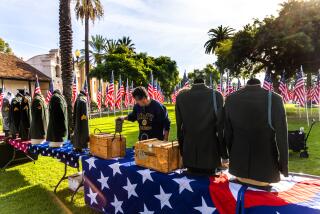Ex-Marine rebuilds his life after brush with death in Iraq
- Share via
San Diego — In his San Diego apartment, retired Marine Gunnery Sgt. Nick Popaditch keeps two jagged hunks of metal from Iraq: one from a day of triumph, the other from the day he almost died.
One piece is from the statue of Saddam Hussein that Marines pulled down in central Baghdad in April 2003. A news photo from that day shows a grinning, cigar-smoking Popaditch sitting atop his tank as the statue fell.
The other piece is from the rocket-propelled grenade that, 12 months later, nearly killed Popaditch during a fight in Fallouja. He lost his right eye and 92% of the vision in his left.
The explosion also destroyed his dream of reaching sergeant major, the senior enlisted rank.
His recovery has been long and difficult, physically and emotionally. “I almost totally lost track of who I am,” he said.
But now Popaditch has a new life and new set of goals. He works with other wounded veterans and is a sought-after motivational speaker.
He also has enrolled at San Diego State, with the goal of becoming a high school history or social studies teacher. He reads with the aid of magnifying devices. But for a recent B in Japanese, he would have a 4.0 grade point average.
“I’ve been a drill instructor and I’ve been in combat,” he said, laughing. “I figure I can teach in high school.”
Popaditch also has written a book, with freelance writer Mike Steere, about his life in the Marine Corps, his combat experiences and his refusal to blame anyone for his injuries or feel sorry for himself.
He holds no grudge against the insurgent who fired the rocket-propelled grenade.
“I was trying to kill him; he just hit me first,” Popaditch said matter-of-factly. “If you are going out as a Marine, you want to go out in a gunfight. The one I went out in was a pretty good one.”
His book, “Once a Marine: An Iraq War Tank Commander’s Inspirational Memoir of Combat, Courage and Recovery,” is conversational and plain-spoken. He wants his words to set an example for others who have been wounded or injured in war or civilian life.
“I want people to see that when you’re faced with a life-changing event, you can survive,” Popaditch said. “When you get rearranged physically, one thing that doesn’t change is your character.”
He has had several operations to remove shrapnel from his head, nose and eye, although he had to wage a months-long battle against military bureaucracy to get proper benefits. The Marine Corps, over his objections, moved to retire him as medically unfit for active duty after 15 years of service.
There is video on the Internet of the moment of his injury -- of a bloody and semiconscious Popaditch being pulled from his burning tank just after shards from the insurgent-fired RPG punctured his helmet and gouged out his eye.
When he returned to the Marine Corps base at Twentynine Palms, Calif., he had hopes of regaining full sight in his left eye. Now he is resigned to the notion that it will never improve beyond the 8%.
Popaditch’s apartment is decorated with recruiting posters and other memorabilia. But he says he cannot bear to go to Camp Pendleton or Twentynine Palms when Marines are deploying or returning from Iraq or Afghanistan.
“It’s just a reminder that it’s a world that I’m not a part of anymore,” he said.
When he went to the Naval Medical Center San Diego to be fitted for a prosthetic eye, he said, he found he wasn’t alone. In the waiting room, it was him and “seven one-eyed jarheads.”
Popaditch asked the technician to make him an eye decorated with the Marine Corps’ eagle-globe-and-anchor logo. He also got two others: one with the gun sights of a tank gunner and one with the logo of the 1st Tank Battalion.
Popaditch takes the San Diego Trolley to San Diego State. The trolley has a stop near the apartment where he lives with his wife, April, and their son, Nicholas Jr., 15.
Although he is legally blind, he refuses to use a white-tipped cane or seek help from the disabled-student center on campus. “He won’t take advantage of their services,” his wife said. “He wants to be on the same level as other students.”
At 41, Popaditch is two decades older and a world of experience apart from his classmates. To many of them, the war is only an abstraction.
Popaditch admits he sometimes gets rankled at political talk that he believes disrespects military sacrifice: “It bothers me a lot to see things that Marines fought and died for being trampled.”
But he doesn’t hear much of that at San Diego State, he said. In fact, people don’t talk about Iraq much at all, which is fine with him.
“That’s what I fought for,” he said, “so people can go to college without worrying about war.”
--
More to Read
Sign up for our Book Club newsletter
Get the latest news, events and more from the Los Angeles Times Book Club, and help us get L.A. reading and talking.
You may occasionally receive promotional content from the Los Angeles Times.










